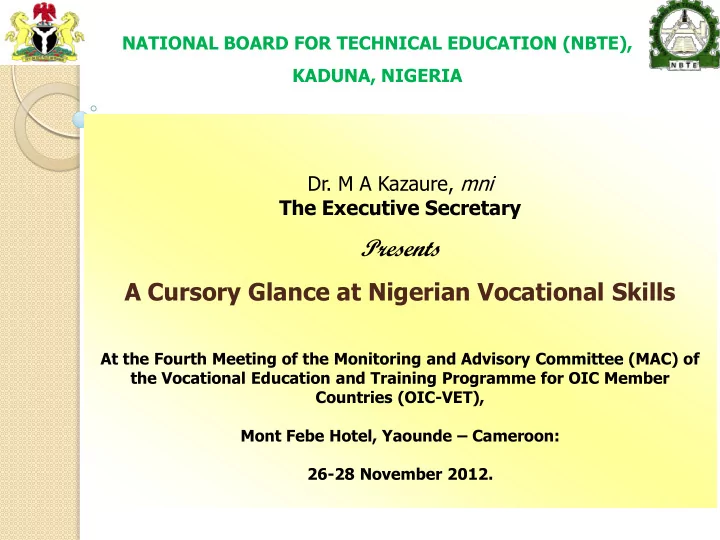

NATIONAL BOARD FOR TECHNICAL EDUCATION (NBTE), KADUNA, NIGERIA Dr. M A Kazaure, mni The Executive Secretary Presents A Cursory Glance at Nigerian Vocational Skills At the Fourth Meeting of the Monitoring and Advisory Committee (MAC) of the Vocational Education and Training Programme for OIC Member Countries (OIC-VET), Mont Febe Hotel, Yaounde – Cameroon: 26-28 November 2012.
Nigeria – Lower middle income – 158.4 m(2.5%annual) Population(2010) Land Mass – 923,768 Sq. Km – US $1,222 GDP per capita Agriculture – 33% of GDP Industry – 44% of GDP Edu. Share of Budget – 11.6% (Federal, 2012) System of Govt. – Federal, Republic National Assembly – Senate(109), House(360) – States – 36States +FCT: 774LGAs Ethnic Entities – Over 200 2
NIGERIA SYSTEM OF EDUCATION (6-3)-3-4 FORMAL EDUCATION NON-FORMAL AGE DURATION KNOWLEDGE ABILITY PERFORMANCE (YRS) (YRS) DOCTORATE Fellowship MASTERS PROFESSIONAL UNIVERSITIES INSTITUTIONS Member- P-HND (1-2YRS)PGDE ship 19-22 4 18 MTHS KNOWLEGEABLE-COMPETENT-SEMI SKILLED Associate- BACHELOR’S COLLEGES OF POLYTECHNICS/IEIs TTC HND ship DEGREE ECUCATION (1YR) (2yrs) Gradute- (4 yrs) ship NCE (T/B) (3YRS) ND INSTITU- ANTC/ANCC (2yrs) OTHER EMPLOYMENT TRADE TEST I TIONS DIPS, CERT ETC LABOUR CENTRES SENIOR SEC. SCHOOLS TECH. COLLEGES & VEIs TRADE 16-18 3 (SSS) (3 YRS) (3 YRS) Nat. Technical/ TESTS BEST Senior Secondary Certificate Business Certificates III & II NTC/NBC 12-15 3 JUNIOR SEC. SCHOOLS (JSS) (3YRS) APPRENTICESHIP Junior School Certificate (JSC) 6-11 6 PRIMARY SCHOOLS (6 YRS) 3 Primary School Certificate (PCS)
Purpose of TVE The purpose of TVE as stated in Act No. 16 of 1985 Education (National Minimum Standards and Establishment of Institutions) are: Provision of trained manpower in engineering, applied science, technology and commerce at all professional grades; Provision of qualified and well-equipped personnel to apply scientific knowledge to the improvement and solution of environmental problems for use and convenience of man; 4
NUMBER, TYPE AND OWNERSHIP OF ACCREDITED TECH. AND VOC. EDUCATION INSTITUTIONS IN NIGERIA, DEC. 2011 INSTITUTION OWNERSHIP TOTAL TYPE Federal State Private Polytechnics 20 38 17 75 Monotechnics Colleges of Agriculture 15 16 - 31 Colleges of Health Technology 6 7 - 13 Other Specialized Institutions 13 4 1 18 IEIs 1 1 87 89 Sub-Total 55 66 105 226 Technical Colleges 19 152 3 174 VEIs - 2 32 34 GRAND TOTAL 74 220 140 434 5
CHALLENGES Low Access in TVET Institutions • Low Carrying Capacity of TVET (Tertiary) Institutions (326,521 in 2011) • High cost of Technical Education • Low enrollment of female students in Polytechnics & Monotechnics less than 38% • Low societal estimation of TVET 6
Major Reform Activities Institutionalization of Quality Assurance System in polytechnics, monotechnics, technical colleges and VEIs & IEIs, via a system of accreditation , resources inspection and advisory visitations Development & implementation of Curriculum, T eacher’s Guide and Training Manuals for 3 modules of the course in Entrepreneurial Education Course 7
Major Reform Activities Establishment of Vocational and Innovation Enterprise Institutions (VEIs & IEIs) – Public- Private-Partnership Provide a credible alternative to HE Widen Access to TVET Provide training in areas that are not in the conventional HE Institutions Private Sector-led TVET Training in PPP Industry focus, skills-based training 8
Development of a National Vocational Qualifications Framework, NVQF National Vocational Qualifications Framework (NVQF) is being established as a system for the recognition of skills and competencies acquired in a variety of ways benchmarked in a progressive level: Formal-Informal or Non-Formal 9
Development of a National Vocational Qualifications Framework, NVQF SIX LEVELS Level 1 : Entry Level or unskilled employees Level 2 : Foundation or basic skilled employees Level 3 : Operators or semiskilled employees Level 4 : Technicians, craft, skilled and supervisory employees Level 5 : Technical and junior management positions Level 6 : Professional engineers and senior management positions 10
Development of a National Vocational Qualifications Framework, NVQF 11
Collaborations and Partnerships Organisational Structures of Entrepreneurship Centres Chief Executive Officer Governing Board Technical Business Training/Resear Finance/Sup Services development ch Manager ply Manager Manager Manager 12
Other Achievements NBTE CENTER OF EXCELLENCE FOR TVET IN WEST AFRICA Established in 2011 to undertake activities related to TVET Policy & Human Resource Development Innovation & dissemination of best practices Headed by a Director & a small number of staff The Centre consists of large and small conference facilities, IT room & 13 rooms ensuite African Virtual Campus UNEVOC Centre Hope to become a UNESCO Category II Centre of Excellence by 2013 13
THANK YOU 14
Recommend
More recommend